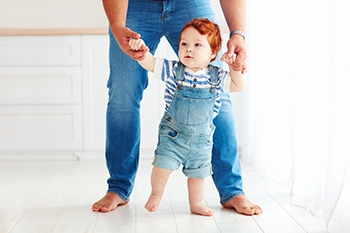

When babies are born, their foot bones are not fully developed and act more like cartilage. The significant milestone of standing occurs when their feet, legs, hips, and core can support their weight, typically between nine to 18 months of age. Once they start walking, running and jumping will quickly follow. Although foot structure is usually developed by age two, complete development continues until the teen years. Given the crucial role of feet in standing and movement, parents need to care for their children's feet from an early age to avoid potential motor skill and ability issues in the future. Parents often wonder when it is appropriate to introduce shoes to their babies. Initially, shoes are unnecessary as they can hinder foot growth and movement. However, once walking is mastered, shoes become relevant. Keep in mind that rapid growth necessitates frequent changes in shoe size. As children get older, the speed of foot growth slows down. It is crucial to invest in well-fitting, durable shoes that support movement, balance, and coordination. Regularly checking shoe fit and promptly replacing them when outgrown is recommended by experts. On average, a child's shoes need to be changed every three to four months. If you have additional questions about your toddler’s feet, it is suggested that you consult a podiatrist who can provide valuable information.
The health of a child’s feet is vital to their overall well-being. If you have any questions regarding foot health, contact Dr. Alan J. Spector of Shore Podiatry. Our doctor can provide the care you need to keep you pain-free and on your feet.
Tips for Keeping Children's Feet Healthy
If you have any questions, please feel free to contact our office located in Point Pleasant, NJ . We offer the newest diagnostic and treatment technologies for all your foot care needs.